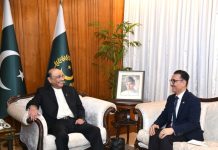From Lawrence Tissera
COLOMBO: Sri Lanka will restart bailout talks with the International Monetary Fund (IMF) in August, its new president said on Wednesday, while calling on lawmakers to form an all-party government to resolve a crippling economic crisis.
In a speech in parliament, President Ranil Wickremesinghe said that constitutional amendments were required to curtail presidential powers — indicating he would meet a key demand of protesters who forced out his predecessor, Gotabaya Rajapaksa.
“The president of a country does not have to be a king or a god who is exalted above the people. He or she is one of the citizens,” Wickremesinghe said.
The island nation of 22 million people is facing its worst financial crisis since independence from Britain in 1948 with its foreign exchange reserves at record lows, and the economy battered by the COVID-19 pandemic and a steep fall in government revenue.
Angered by persistent shortages of essentials, including fuel and medicines, and sky-rocketing inflation of over 60% year on year, hundreds of thousands of people took to the streets in early July, forcing Rajapaksa to first flee the country and then quit office.
Wickremesinghe, who was then prime minister, took over as acting president and was later confirmed in the job by parliament.
Discussions with the IMF for a four-year programme that could provide up to $3 billion would resume in August, Wickremesinghe told lawmakers in his first major address to parliament since taking over.
The government is working with its financial and legal advisers Lazard and Clifford Chance to finalise a plan to restructure overseas debt, including about $12 billion owed to bondholders.
“We would submit this plan to the International Monetary Fund in the near future, and negotiate with the countries who provided loan assistance,” Wickremesinghe said.
“Subsequently negotiations with private creditors would also begin to arrive at a consensus.”
A veteran lawmaker whose party only held one seat in parliament, Wickremesinghe won a leadership vote in the 225-member house last month with the support of the country’s ruling party which is dominated by the Rajapaksa family.
But the new president reiterated his call for a unity government, adding that he had already initiated discussions with some groups.
“I respectfully extend the hand of friendship to all of you. I confidently invite you to put aside the past and come together for the sake of the country,” Wickremesinghe said.
Opposition lawmaker Harsha de Silva backed the president’s proposal. “We must come together; specifically an all or multi-party government for a limited period of time to work towards creating this new #SriLanka on a common minimum program,” he said in a tweet.
With an interim budget likely to be presented within weeks, Wickremesinghe said his government was working on a long-term economic plan. This would include bringing down public debt from its current level of 140% of Sri Lanka’s GDP to less than 100% within 10 years and creating a budget surplus by 2025.
He did not give any details. Wickremesinghe, who has been accused by activists and rights groups of cracking down on anti-government protesters, said peaceful struggle was a fundamental right but he would not tolerate violence. “I will not allow anyone to act outside the law,” he said.




